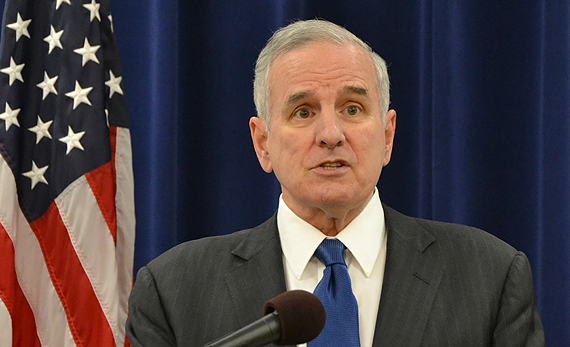

Share
Governor Mark Dayton’s state budget proposal is drawing positive response from the union representing educators.
His $42 billion, two-year budget proposal, released Tuesday, is heavily focused on Minnesota’s youngest residents. It would spend more than half of the state’s projected $1 billion budget surplus on program areas like childhood education and child health, and would provide nearly $100 million in child care assistance tax credits to Minnesota families.
“I’m placing my priority on the future of Minnesota,” Dayton said during a morning news conference.
The proposed spending, he said, is aimed squarely at closing the state’s achievement gap between white and minority students by doing more, earlier, to place less of a burden on the state’s schools to solve the disparities.
The governor’s proposed budget includes:
- An additional $373 million in pre-K-12 education spending;
- $109 million to provide free, voluntary statewide pre-K programs for 4 year olds;
- $93 million in new higher education spending; and
- $44 million of new investment to improve access to child care for low-income families.
Denise Specht, president of Education Minnesota, the union representing 70,000 educators, responded positively to the announcement.
“It’s clear Gov. Mark Dayton wants to build on the progress Minnesota has made in education,” Specht said. “His budget proposal recognizes the diverse needs of our students, and we look forward to working with him and the entire Legislature to improve public education this session.
“It also reflects the importance of early education and the role poverty plays in student success. Access to programs that work, like all-day public preschool for all 4-year-olds, and free school breakfast for our youngest students, will help close the opportunity gap in our schools.”
The governor’s proposal for higher education calls for no increases for the Minnesota State Colleges and Universities system until labor-management issues are resolved at the state’s largest system of higher education.
Dayton cited the disagreements regarding the Charting the Future strategic plan, an initiative of Chancellor Steven Rosenstone, as a reason for his decision.
MnSCU administrators and the leaders of the Inter Faculty Organization and the Minnesota State College Faculty organizations issued a statement in response.
“We take the governor’s decision not to recommend new funding for Minnesota State Colleges and Universities at this time very seriously and we appreciate the governor’s commitment to supporting MnSCU and its vital mission of ensuring access to an affordable, high value education for all Minnesotans and meeting the workforce needs of Minnesota,” they said.
“We understand and share the governor’s concerns and are taking positive steps and having substantive dialogue to resolve our disagreements regarding Charting the Future. We are all committed to continuing our progress and are confident of a positive outcome. All MnSCU faculty and staff have a passionate commitment to improving the lives of our students through education and look forward to working with the governor on a budget that ultimately meets the needs of our students and the state of Minnesota.”
This article includes information from Session Daily, the online publication of the Minnesota House.

